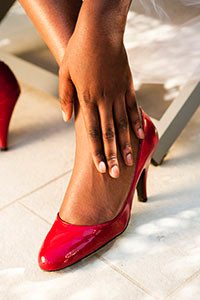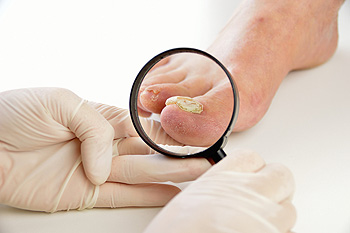Blog
The Importance of Properly Stretching The Feet While Working
 For people who stand or walk during work for the majority of the day, it may be common to experience pain, discomfort and muscle strain throughout the body. Research has shown the importance of wearing proper footwear that will provide the necessary support for optimum comfort. Flip flops, high heels, and sandals may not be the best choice for working on your feet all day. These types of shoes may alter the way you walk, in addition to possibly cramping the toes or shortening the stride. It may be beneficial to stretch the feet before and after work. This may aid in developing the necessary muscle strength to help the feet to feel more comfortable during the day. Effective exercises that may accomplish this, are pointing and flexing the feet, in addition to performing exercises that strengthen the hips, legs, and feet. Please consult with a podiatrist for suggestions and additional information on how to properly stretch your feet.
For people who stand or walk during work for the majority of the day, it may be common to experience pain, discomfort and muscle strain throughout the body. Research has shown the importance of wearing proper footwear that will provide the necessary support for optimum comfort. Flip flops, high heels, and sandals may not be the best choice for working on your feet all day. These types of shoes may alter the way you walk, in addition to possibly cramping the toes or shortening the stride. It may be beneficial to stretch the feet before and after work. This may aid in developing the necessary muscle strength to help the feet to feel more comfortable during the day. Effective exercises that may accomplish this, are pointing and flexing the feet, in addition to performing exercises that strengthen the hips, legs, and feet. Please consult with a podiatrist for suggestions and additional information on how to properly stretch your feet.
While working on the feet, it is important to take the proper care of them. For more information about working on your feet, contact one of our podiatrists from Pennsylvania. Our doctors will treat your foot and ankle needs.
Working on Your Feet
Standing on your feet for long periods of time can cause stress and pain in your feet. Your whole body may experience change in terms of posture, back pain, bunions, callouses and or plantar warts. There are ways to avoid these conditions with proper foot care, smart choices and correct posture.
Positive Changes
Negative heeled shoe – Choosing this shoe type places the heel slightly lower than the ball of the foot. These are great for overall foot health. Find shoes that fit you correctly.
Go barefoot – Our feet were not designed to be enclosed for all hours of the day. Try to periodically expose your feet to air.
Eliminate Pain
Foot Exercises – Performing simple exercises, incorporating yoga and doing stretches are beneficial. This will allow increased blood flow to the area and muscles of the foot.
Achilles tendon – Stretching the foot out flat on the floor will relax the calf muscles and tendon. These exercises can be performed almost anywhere. Make sure you add these exercises to your daily regimen.
With a little bit of this information and knowing more about foot health, you will notice changes. Foot stretches and proper footwear will help with pain and prevent further issues.
If you have any questions please feel free to contact one of our offices located in Plymouth Meeting and Ambler, PA . We offer the newest diagnostic and treatment technologies for all your foot and ankle needs.
Common Foot Ailments in Pregnant Women
 It’s common for pregnant women to complain about foot pain or swollen feet. Developing flat feet is equally as common, and this is typically a result of the excess weight that is gained from the developing fetus. Research has shown that this may affect a women’s center of gravity, which may alter overall posture. Despite the fact that most of these uncomfortable ailments may diminish after pregnancy, there are ways to minimize the discomfort they cause. These may include elevating the feet above the heart, which may aid in improving circulation in the early stages of pregnancy. It is beneficial to eat a well-balanced and healthy diet, which involves lower salt content. This can possibly eliminate excess fluid from accumulating. It’s also suggested to sleep on your side rather than on your back. Practicing gentle exercises may aid the decrease of fluid retention. Please consult with a podiatrist for additional information on how pregnancy affects your feet.
It’s common for pregnant women to complain about foot pain or swollen feet. Developing flat feet is equally as common, and this is typically a result of the excess weight that is gained from the developing fetus. Research has shown that this may affect a women’s center of gravity, which may alter overall posture. Despite the fact that most of these uncomfortable ailments may diminish after pregnancy, there are ways to minimize the discomfort they cause. These may include elevating the feet above the heart, which may aid in improving circulation in the early stages of pregnancy. It is beneficial to eat a well-balanced and healthy diet, which involves lower salt content. This can possibly eliminate excess fluid from accumulating. It’s also suggested to sleep on your side rather than on your back. Practicing gentle exercises may aid the decrease of fluid retention. Please consult with a podiatrist for additional information on how pregnancy affects your feet.
Pregnant women with swollen feet can be treated with a variety of different methods that are readily available. For more information about other cures for swollen feet during pregnancy, consult with one of our podiatrists from Pennsylvania. Our doctors will attend to all of your foot and ankle needs.
What Foot Problems Can Arise During Pregnancy?
One problem that can occur is overpronation, which occurs when the arch of the foot flattens and tends to roll inward. This can cause pain and discomfort in your heels while you’re walking or even just standing up, trying to support your baby.
Another problem is edema, or swelling in the extremities. This often affects the feet during pregnancy but tends to occur in the later stages.
How Can I Keep My Feet Healthy During Pregnancy?
- Wearing orthotics can provide extra support for the feet and help distribute weight evenly
- Minimize the amount of time spent walking barefoot
- Wear shoes with good arch support
- Wear shoes that allow for good circulation to the feet
- Elevate feet if you experience swelling
- Massage your feet
- Get regular, light exercise, such as walking, to promote blood circulation to the feet
If you have any questions please feel free to contact one of our offices located in Plymouth Meeting and Ambler, PA . We offer the newest diagnostic and treatment technologies for all your foot and ankle needs.
Causes of Toenail Fungus
 Toenail fungus is a common ailment and may typically be noticed by the yellowing and thickening of the affected toenail. If left untreated, the nail may gradually turn black and may cause an unsightly appearance. There may be several reasons for this condition to occur, including sweaty feet caused by wearing shoes that do not allow enough air to circulate, or enduring specific health issues such as psoriasis or diabetes. The toenail fungus may cause an infection, and it’s suggested to consult with a podiatrist if the infection should become severe. A proper diagnosis can be performed, which may include testing a portion of the nail to determine the exact cause of the infection followed by discussing correct treatment options.
Toenail fungus is a common ailment and may typically be noticed by the yellowing and thickening of the affected toenail. If left untreated, the nail may gradually turn black and may cause an unsightly appearance. There may be several reasons for this condition to occur, including sweaty feet caused by wearing shoes that do not allow enough air to circulate, or enduring specific health issues such as psoriasis or diabetes. The toenail fungus may cause an infection, and it’s suggested to consult with a podiatrist if the infection should become severe. A proper diagnosis can be performed, which may include testing a portion of the nail to determine the exact cause of the infection followed by discussing correct treatment options.
If left untreated, toenail fungus may spread to other toenails, skin, or even fingernails. If you suspect you have toenail fungus it is important to seek treatment right away. For more information about treatment, contact one of our podiatrists of Pennsylvania. Our doctors can provide the care you need to keep you pain-free and on your feet.
Symptoms
- Warped or oddly shaped nails
- Yellowish nails
- Loose/separated nail
- Buildup of bits and pieces of nail fragments under the nail
- Brittle, broken, thickened nail
Treatment
If self-care strategies and over-the-counter medications does not help your fungus, your podiatrist may give you a prescription drug instead. Even if you find relief from your toenail fungus symptoms, you may experience a repeat infection in the future.
Prevention
In order to prevent getting toenail fungus in the future, you should always make sure to wash your feet with soap and water. After washing, it is important to dry your feet thoroughly especially in between the toes. When trimming your toenails, be sure to trim straight across instead of in a rounded shape. It is crucial not to cover up discolored nails with nail polish because that will prevent your nail from being able to “breathe”.
In some cases, surgical procedure may be needed to remove the toenail fungus. Consult with your podiatrist about the best treatment options for your case of toenail fungus.
If you have any questions, please feel free to contact one of our offices located in Plymouth Meeting and Ambler, PA . We offer the newest diagnostic and treatment technologies for all your foot care needs.
The Definition of a Podiatrist
 A doctor that specializes in disorders of the foot is referred to as a podiatrist. This type of doctor typically treats foot conditions including hammer toe, bunions and ingrown toenails. They may also treat foot ailments caused by birth defects such as clubfoot and flat feet. Diabetic patients often notice sores on their feet, which may heal slowly, and this may be one of the first symptoms indicating this condition exists. Within this field, there are categories specific to the type of patient that is being treated. For instance, podiatrists who specialize in sports medicine typically treat athletes. Doctors who are skilled in advanced surgery may perform foot and ankle reconstruction, which may be a necessary option after an injury. If you have any questions regarding podiatry, please consult with your podiatrist.
A doctor that specializes in disorders of the foot is referred to as a podiatrist. This type of doctor typically treats foot conditions including hammer toe, bunions and ingrown toenails. They may also treat foot ailments caused by birth defects such as clubfoot and flat feet. Diabetic patients often notice sores on their feet, which may heal slowly, and this may be one of the first symptoms indicating this condition exists. Within this field, there are categories specific to the type of patient that is being treated. For instance, podiatrists who specialize in sports medicine typically treat athletes. Doctors who are skilled in advanced surgery may perform foot and ankle reconstruction, which may be a necessary option after an injury. If you have any questions regarding podiatry, please consult with your podiatrist.
If you are dealing with pain in your feet and ankles, you may want to seek help from a podiatrist. Feel free to contact one of our podiatrists from Pennsylvania. Our doctors can provide the care you need to keep you pain-free and on your feet.
What Is a Podiatrist?
A podiatrist is a doctor of podiatric medicine who diagnoses and treats conditions of the foot, ankle, and related structures of the leg. Your podiatrist may specialize in a certain field such as sports medicine, wound care, pediatrics, and diabetic care. Podiatrists have the ability to become board certified through training, clinical experience, and then taking an exam.
What Do Podiatrists Do?
On a daily basis, a podiatrist may perform the following activities:
- Diagnose foot ailments such as ulcers, tumors, fractures, etc.
- Use innovative methods to treat conditions
- Use corrective orthotics, casts, and strappings to correct deformities
- Correct walking patterns and balance
- Provide individual consultations to patients
It is very important that you take care of your feet. It’s easy to take having healthy feet for granted, however foot problems tend to be among the most common health conditions. Podiatrists can help diagnose and treat a variety of feet related conditions, so it is crucial that you visit one if you need assistance.
If you have any questions please feel free to contact one of our offices located in Plymouth Meeting and Ambler, PA . We offer the newest diagnostic and treatment technologies for all your foot and ankle needs.
